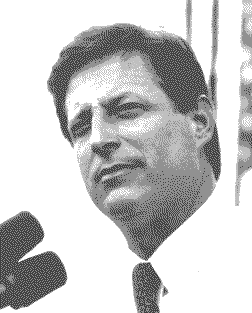Posted on August 4, 2010
Compact Trash
Nix the National Popular Vote
by
Daniel Clark
From first glance at its website, one could easily mistake the National Popular Vote organization for a collection of Tea Party activists. Between all the quotations from, and images of, the U.S. Constitution, one would never guess that the group was advocating a grossly unconstitutional initiative. Not until reading the details of the proposal, that is.

The stated purpose of NPV is to ensure that every presidential election is won by the candidate who receives the greatest number of popular votes. It hopes to achieve this by persuading enough states to pass a law requiring that their electoral votes be cast for the winner of the national popular vote, regardless of the outcomes within their individual states. The laws passed in those various states would be enacted at the moment that they represented the decisive total of 270 electoral votes.
The site attempts to assuage constitutional concerns about this campaign, in part by pointing out that Article II Section 1 of the Constitution grants the state legislatures the power to determine the manner of appointing electors. Ironically, this was one of the clauses cited on behalf of George W. Bush in the Bush v. Gore case, which halted the Florida Supreme Court's attempt to rob the legislature of that same power.
As hard as the movement tries to put on a facade of bipartisanship, its endorsements come from a conspicuously politically uniform collection of left-leaning civic organizations, Earth-worshipping greenies, and racial Balkanists. Moreover, the five states that have already passed the initiative are the liberal strongholds of Illinois, Maryland, New Jersey, Washington and Hawaii, with Massachusetts and New York apparently soon to follow.
If this is causing you to doubt the sincerity of NPV's fealty to the Constitution, you're not mistaken. In an essay entitled "Constitutionality of the National Popular Vote Bill," the group quotes Article II Section 1, in order to dismantle the straw-man argument that the awarding of electoral votes by statewide popular vote is constitutionally required. When it comes to the more substantive objection, however, it does not quote the Constitution, nor does it even directly state the issue at hand.
Article I Section 10 says, "No State shall enter into any Treaty, Alliance or Confederation," and also that "No State shall, without the Consent of Congress … enter into any Agreement or Compact with another State." Rather than dealing with these obstacles in a forthright manner, NPV offers the dubious assurance that, "we are not aware of any case in which the courts have invalidated an interstate compact."
It may very well be that the courts have allowed interstate compacts without congressional approval, but that does not literally make them constitutional. By using the absence of legal precedent as a means of nullifying the written law, NPV is essentially mimicking Al Gore's "no controlling legal authority" defense. That's hardly what you'd expect from constitutional sticklers.

Agreements that are commonly described as "interstate compacts" tend to involve the cooperative administration of a natural resource or public service that is peculiar to those states that are parties to the agreement. The Gulf States Marine Fisheries Commission is one example of this. To liken NPV to these agreements by calling it a "compact" is consciously deceitful. Unlike these interstate compacts, a union of certain states for the purpose of altering the manner in which American presidents are elected clearly meets the definition of an alliance or confederation, and is thus outright forbidden by the Constitution.
Moreover, the very fact that the allocation of electoral votes is a state responsibility makes the concept of a national popular vote logically problematic. Synthesizing the votes cast under 51 separate and incongruous standards into a single, raw vote count would be an injustice to those states with responsible election laws. States that inflate their vote totals by implementing early voting and voting by mail, allowing same-day registration, and generally turning a blind eye toward voter fraud, could overwhelm the totals from states that treat the electoral process with the respect it deserves.
Obviously, this would favor the Democrats, who endorse all of those fraud-friendly measures, while vigorously opposing every attempt to require that voters identify themselves. Voter fraud in Chicago, for example, would no longer be contained in the already solid blue state of Illinois, but would bleed across state lines, threatening to steal the electoral votes of other states that had been gullible enough to buy into NPV's sophistry.
That makes NPV not only an unconstitutional alliance or confederation, but a conspiracy.
-- Daniel Clark is a Staff Writer for the New Media Alliance. The New Media Alliance is a non-profit (501c3) national coalition of writers, journalists and grass-roots media outlets.
The Shinbone: The Frontier of the Free Press
Mailbag . Issue Index . Politimals